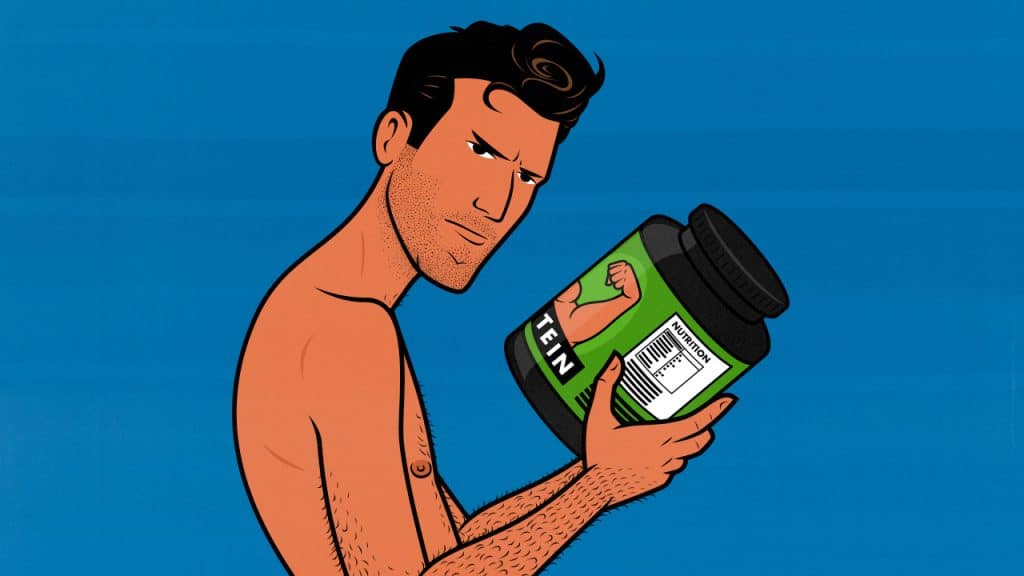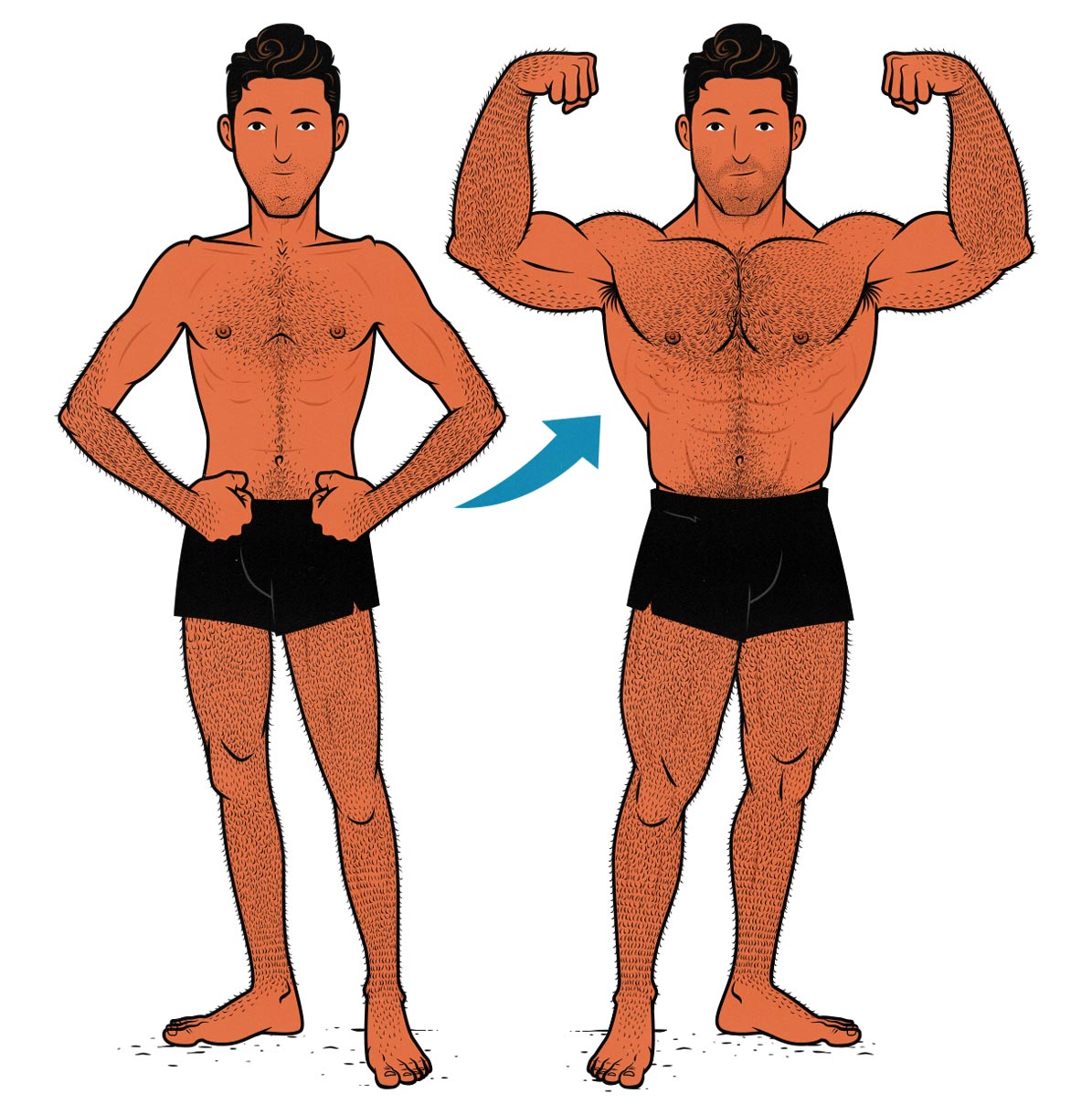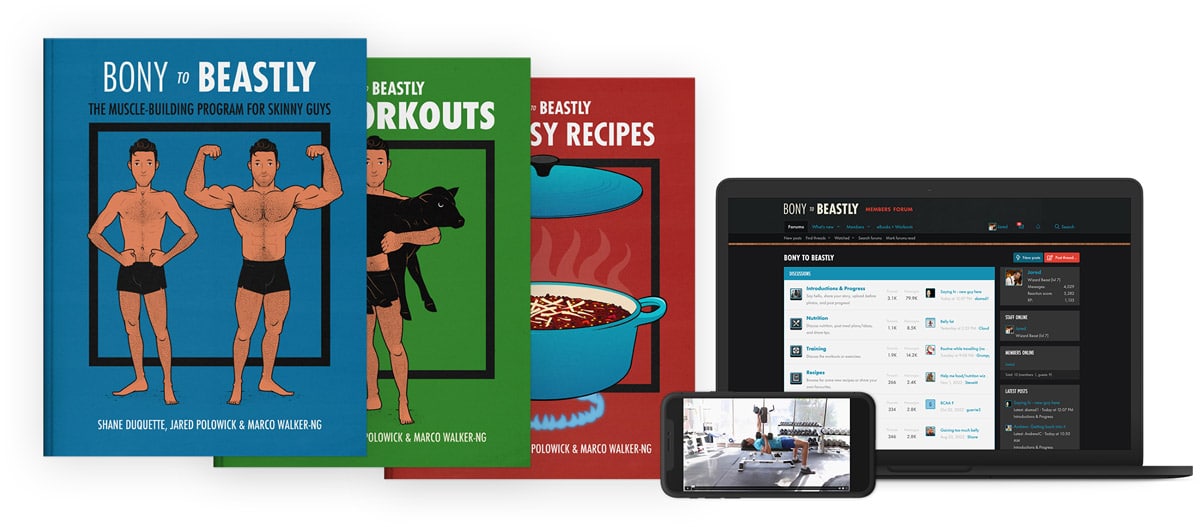
The Best Protein Powder for Bulking (2025)
I’ll tell you the best protein powder for bulking, but you might be asking the wrong question. Protein is an important part of a balanced bulking diet, and protein powder is an easy way to get that protein, but you might be thinking of a weight gainer.
Weight gainers are high-calorie bulking supplements that contain both protein and carbs. You mix it into water just like protein powder, but you can get around 10x as many calories per serving. That can make it easier to gain weight. That might be what you’re thinking of. We’ll cover the best weight gainers, too.

The Best Type of Protein Powder for Bulking
There are a few different types of protein powder, each with its own pros and cons:
- Whey protein comes from milk. It contains every amino acid and digests quickly and easily, making it great for building muscle. It makes for the best default protein powder. There are a few different types:
- Whey protein hydrolysate is the most heavily processed type of whey protein. It also tends to be the most expensive. It can be good for people who have trouble digesting regular whey protein, but in that case, a plant-based protein might be even better.
- Whey protein isolate has most of the carbs and lactose filtered out, giving you a relatively pure protein powder that still contains some other micronutrients. This is the best type of protein powder for most people, but it isn’t quite ideal for bulking.
- Whey protein concentrate doesn’t have as many nutrients filtered out. It’s a little higher in carbs and calories than hydrolysates and isolates, and you get some extra micronutrients. It’s often a little cheaper. This makes for the best default when bulking.
- Plant-based protein powders are usually made from the protein found in soy, rice, peas, and legumes. They got off to a bit of a rocky start, and they’ve suffered through their controversies, but they’ve landed in a good place. Plant-based protein blends offer a great amino acid breakdown, digest relatively easily, cost about the same amount as whey, and taste pretty good. Similar to whey concentrate, the protein comes packaged with some extra carbs. That’s a boon while bulking.
- Casein protein is the other protein found in milk. It’s good for baking protein into foods, but it digests more slowly than whey and doesn’t offer any other notable advantages. It’s rarely the best protein powder for bulking.
- Strange protein powders: you can also find cricket, mealworm, and meat-based protein powders. Those can be fine, but as the research currently stands, it’s probably better to choose whey or a plant-based protein powder.
Note that you shouldn’t use collagen protein powder. Collagen has its uses, maybe, but it isn’t very good for building muscle. We have a quick research breakdown on collagen here.
Overall, whey protein concentrate and plant-based protein powders are best for bulking. Whey protein isolate is great, too. You’ll just pay a bit more per calorie.
The Best Brands of Protein Powder
The next question is which brands of protein powder offer the highest-quality protein powders. There’s been quite a lot of controversy over the years, with some whey protein containing very little whey, and some plant-based protein powders far too high in heavy metal. I enjoy heavy metal as much as the next guy, but I’d rather lift it or listen to it than eat it. Every type of protein powder can have issues with microplastics, such as bisphenol A (BPA).
Fortunately, there are third-party labs (such as LabDoor and ConsumerReport) that test the big brands, testing protein per serving and looking for contaminants. Truvani, Ancient Nutrition, and Orgain Organic Protein all failed the tests.
As of 2024, here are the best brands of protein powder:
- Optimum Nutrition Whey Isolate (Amazon Affiliate Link) is the big name brand with the best reputation. It always tests fairly well. You can find it at most retailers at a reasonable price. The double-rich chocolate flavour tastes pretty good mixed into water. I’ve been happily using it for over a decade with zero issues.
- Nutricost Grass-Fed Whey Concentrate (Amazon Affiliate Link) is a cheap, high-quality whey protein that’s perfect for bulking. It has classic flavours like chocolate and vanilla, but it also comes unflavored, making it easy to mix into anything (smoothies, oatmeal, etc). However, it doesn’t dissolve as easily or taste as good as Optimum Nutrition’s protein.
- Now Pea Protein (Amazon Affiliate Link) is a cheap, high-quality plant-based protein powder. I haven’t tried this one. Cassandra and I usually buy Birdman pea protein (Amazon Affiliate Link), but Birdman is a smaller brand that hasn’t been extensively tested. We’re taking a bit of a gamble.
How to Use Protein Powder While Bulking
We recommend eating at least 0.7 grams of protein per pound of body weight per day while bulking (explanation here). That’s enough to maximize your rate of muscle growth. More is fine, but it won’t improve your bulking results.
Most of your protein should come from whole foods like lean meat, fish, nuts, seeds, whole grains, fermented dairy, and legumes, but some of that protein can come from protein powder. Most people can get away with having a couple of servings per day without suffering any ill effects (explanation here).
The best time to have a protein shake is right after working out, especially if you aren’t eating a couple hours before and after training (explanation here). But you can have protein powder at any time of day. I like to have it alongside meals that are lower in protein.
The Best Weight Gainers for Bulking
Weight gainers (aka mass gainers) are high-calorie shakes. Some people call them protein shakes, but they usually contain far more calories from carbs, making them more similar to meal-replacement shakes. The ingredients are usually maltodextrin (a processed carb powder), whey protein concentrate, and sweeteners/flavouring, in that order.
The purpose of weight gainers is to get you into a calorie surplus. If you’re a skinny-fat or overweight beginner, you can probably build muscle without a calorie surplus. But if you’re thin, lean, or already in the habit of lifting weights, you’ll probably need to bulk to build muscle. Your body needs extra nutrients to build extra muscle.
Weight gainers do work. They’re rich in carbs, protein, and calories. Those are the nutrients you need to gain weight and build muscle. You can absolutely use them to bulk up. That’s what I did. I used them to help me gain my first 50 pounds.
Weight gainers aren’t inherently fattening or unhealthy, but they’re relatively low in fibre, vitamins, minerals, prebiotics, probiotics, and other micronutrients. You could make a far more nutritious bulking shake by blending up a banana, some oats, frozen berries, a handful of spinach, milk (or milk alternative), a bit of nut butter, and a scoop of protein powder. We’ve got some high-calorie smoothie recipes here.
The Best Brand of Weight Gainer
Weight gainers are trickier than protein powders. Most protein powders contain similar ingredients, but weight gainers can vary quite a bit. Some use maltodextrin, others use ground oats, and still others use designer ingredients like waximaize.
Of those ingredients, ground oats are by far the most nutritious, but when you’re chugging huge amounts of them, they can be a bit hard to digest. If you want more oats in your diet, I’d blend a smaller amount into a smoothie or cook a larger amount as oatmeal.
After trying a few different brands, I settled on Optimum Nutrition’s Serious Mass (Amazon Affiliate Link). It’s a classic weight gainer from a reputable brand with decent ingredients at a fair price. However, as with almost every weight gainer, the serving sizes are much too big. You’ll do better by having half doses.
And again, if you can manage it, I highly recommend blending up your own weight-gain smoothies instead of buying a weight-gainer. That isn’t because weight gainers are bad, but rather because smoothies are one of the most nutritious bulking meals you can eat. It would be a shame to miss out on their many benefits.
Conclusion
Most types of protein powder are similarly good for bulking. The trick is to buy your protein powder from a brand you trust. When in doubt, choose a whey protein concentrate or isolate. If you don’t want to use whey, have a plant-based protein powder. Pea protein powder is quite good.
If you want a high-calorie bulking shake, you could get a weight gainer, but I’d recommend blending up a high-calorie smoothie instead. Blend your protein powder up with some oats, bananas, frozen berries, spinach, nut butter, and milk (or milk alternative). Those smoothies are a nutritional powerhouse, absolutely perfect for bulking up.

If you want us to walk you through the entire bulking process, check out our Bony to Beastly (men’s) program or Bony to Bombshell (women’s) program. They both include a 5-month customizable workout routine, a full bulking diet plan, a bulking recipe book, a deep dive into lifestyle and fitness, and coaching from us.


Muscle-Building Mini-Course via EMAIL
Sign up for our 5-part muscle-building mini-course that covers everything you need to know about:
Here are some related articles